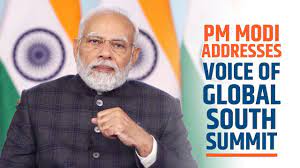Virtual Summit On The Voice Of The Global South:

The Prime Minister of India organised a virtual summit on the “Voice of the Global South”, involving approximately 125 countries.
- The objective of this summit was to solicit the opinions and input of countries from the Global South in order to determine the priorities for the region.
- The term “Global South” is often used to highlight the historical legacy of colonialism and the economic disparities between the formerly colonised nations and the developed Western nations.
- It underscores the challenges faced by these countries in achieving economic growth and development.
- In 1964, the Group of 77 (G-77) countries came into existence when they signed a Joint Declaration during the first session of the UN Conference on Trade and Development (UNCTAD) in Geneva.
- The G-77 became the largest intergovernmental organisation of developing countries at the time.
- It was created to promote the economic interests of developing countries and improve their ability to negotiate on international economic issues within the UN system.
- It now includes 134 countries across Asia, Africa, South America, the Caribbean and Oceania. China is not technically part of the group, hence, the grouping is often referred to as “G-77+China” in multilateral forums.
- The UN Office for South-South Cooperation (UNOSSC) was established in 1974.
- Its role is to coordinate cooperation between countries in the Global South and with developed countries or multilateral agencies, in collaboration with the G-77.
- The Global South, comprising countries with significant populations, recognises that they have the most at stake in shaping the future of the world.
- With three-fourths of the global population residing in these countries, they argue that they should have a proportionate and meaningful voice in global decision-making processes.
- Global South demands an equitable representation in global governance.
- The current model of global governance may not adequately reflect the demographic and economic realities of the world, and there is a call for change to ensure that the voices of the Global South are heard and considered.




